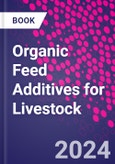Feed additives (natural or synthetic) are formulations added to livestock rations to improve growth rates, reproductive and productive traits, feed efficiency, ruminal fermentation profiles, methane mitigation, digestion and absorption of nutrients, immunity, and overall health of the animal. Organic Feed Additives for Livestock will focus on the beneficial effects of organic feed additives and on food animals, including ruminants, poultry, fish, and more. It will also explore how these feed additives can benefit food animal production, reproduction, and health. Each chapter will cover the significance of an organic feed supplement, especially as an alternative to synthetic growth promoters, with topics including medicinal plants, cold pressed and essential oils, natural antioxidants, emulsifiers, acidifiers and organic acids, fibrolytic enzymes, organic minerals, probiotics, macro- and microalgae, organic nanoparticles, yeast and its derivatives, and bee pollen.
Contributed by a range of livestock and aquaculture specialists from around the world, this book takes a holistic approach to explore how organic additives offer an efficient strategy to improve livestock productivity and health. This reference is an excellent resource for researchers and graduate students interested in animal agriculture, as well as veterinarians, animal nutritionists and breeders, and other livestock specialists. It will allow experts to stay up to date on organic options for livestock and serve as a starting point in generating new research ideas.
Please Note: This is an On Demand product, delivery may take up to 11 working days after payment has been received.
Table of Contents
- Phytobiotics and their application in poultry and aquaculture industry
- Probiotics, prebiotics, and synbiotics in animal and poultry nutrition
- Acidifiers and organic acids in livestock nutrition and health
- Natural antioxidants in farm animals: an eco-friendly tool for improving fertility
- Emulsifiers and their applications in farm animals
- Bee pollen, from the flower to the harvest, and its potential therapeutic properties
- Use of macro- and microalgae in animal nutrition
- The use of bile acids supplement in poultry feed
- Nanoclay in animal diets: properties, structure, applications, and toxicity
- Antibiotic and antimicrobial feed additives
- Methyl donors and their roles in poultry nutrition
- Fibrolytic enzymes in animal and fish nutrition
- Yeast and its derivatives in animal and fish nutrition
- Chelates and organic minerals
- Shedding light on developments in finfish nutrition
Authors
Mahmoud Alagawany Professor of Poultry Nutrition, Faculty of Agriculture, Zagazig University, Zagazig, Egypt. Dr. Mahmoud Alagawany is a Professor of Poultry Nutrition and Physiology at Zagazig University.? His research interests include feed additives; metabolism, traditional and untraditional feeds, herbal plants, immunity, synthetic and natural additives, and feed formulation and feed manufacturing.?According to the Stanford University classification, his name was included in the list of Top 2% of influential scientists in biological sciences for the years 2020 and 2021 as well. Dr. Alagawany was awarded the State Encouragement Prize in Agricultural Sciences in 2018. Dr. Alagawany is an editor of three published books. Alagawany is editor in Chief for the journal of Afro-Asian journal of Biological and Agricultural Sciences. Also, he is an associate editor of Frontiers in Physiology and Revista Brasileira de Zootecnia. He is a member of the Editorial Board of many international journals such as Revista Electronica De Veterinaria, Advances in Animal and Veterinary Science, Universal Journal of Agricultural Research, and Revista Brasileira de Zootecnia. Sobhy Sallam Professor of Animal Nutrition, Alexandria University, Alexandria, Egypt. Dr. Sobhy Sallam is a Professor of Animal Nutritition, Faculty of Agriculture, Alexandria University.?His research interests include the ecological and biochemical function of rumen microorganisms, methane emission in ruminants (mitigation and adaptation), manipulation of rumen microorganisms using different natural and synthetic feed additives, alternative feed resources for ruminant nutrition, interactions among nutrition, reproduction, environment, and genetics in ruminants, and nutrigenetics and nutrigenomics in farm animals.Dr. Sallam was awarded the scientific distinguishment prize of Alexandria University 2021 and Alexandria University award for the scientific encouragement 2009. He was former Vice Dean for Community Service and Environment Development of the Faculty of Agriculture, Alexandria University (2015-2022). Dr. Sallam is member of the Livestock and Fisheries Research Development Council of the Academy of Scientific Research and Technology and a member of Animal Production Promotion committee. He is participating in many research projects as PI, Co-PI and consultant locally and international. Mohamed E. Abd El-Hack Assistant Professor of Poultry Nutrition, Zagazig University, Zagazig, Egypt. Dr. Mohamed E. Abd El-Hack, Assistant Professor of Poultry Nutrition, obtained his Bachelor's degree in 2007, Master's Degree in 2011 and PhD in 2015. Dr. Abd El-Hack was awarded the State Encouragement Prize in Agricultural Sciences in 2018. He also received the Medal of Excellence of the First Class from the President of the Arab Republic of Egypt in 2020. In addition to receiving international awards like Altech Young Scientist Award from USA. According to the Stanford University classification, his name was included in the list of Top 2% of influential scientists in biological sciences for the years 2020 and 2021 as well. Dr. Abd El-Hack's research focuses on organic poultry production by using natural alternatives to antibiotics in feeds to produce safe and healthy food from poultry meat and eggs. The research is also concerned with trying to use alternative feed materials from various agricultural wastes. This trend positively impacts the environment and the economics of poultry production in Egypt. Dr. Abd El-Hack is an editor of three published books. He also acts as an editorial board member for many journals and as a guest editor in others.








